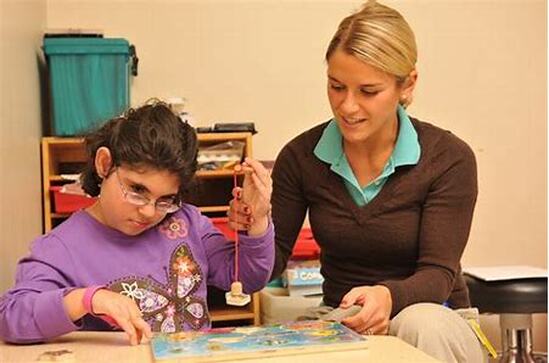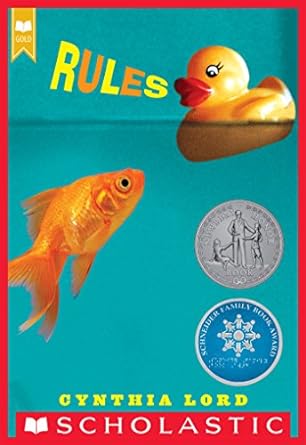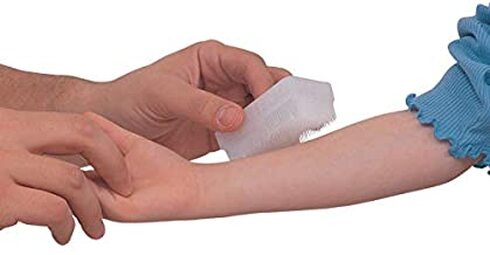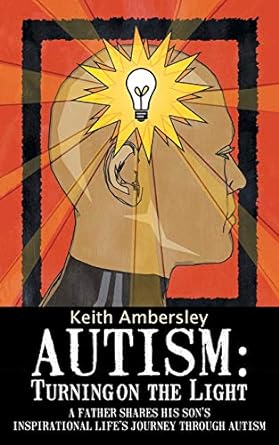What is the most concerning or destructive thing that is going on right now in your child’s world?
Many parents need help with their child’s feeding/eating skills, dressing and toileting skills; as well as educational, playing, and social activities
The following is from Luker, S. (2024); UNIT 7-1, WHO MAY HELP? OTHER THERAPIES, Section 1 (Continued); 4. OT
Occupational therapy teaches skills that help the person live as independently as possible. The role of the Occupational Therapist is to promote, maintain, and develop the skills needed by the autistic child to be functional at home, at school, and beyond. The length, and number of therapy sessions, per week, are determined by the child’s age and need; also, sessions will vary in time and setting.
Rules (for David) by Cynthia Lord, eBook Edition 2003;
Excerpts from Cynthia Lord’s Novel – Rules (for David)
Lord, C. (2003); 7% (David) “It’s Mom!” “Let’s go to the video store!”
(Catherine) “You’re going to occupational therapy.”
(David) Frowning, “Let’s go to the video store.”
(Catherine) “You’re going to OT,” I cover David’s mouth so people won’t hear him scream. I am twelve now and can stay home if I want, but I still like to come.
I still like to come…”
“Because” Catherine says, “…I get Mom completely to myself.”
Tsao, et al. (2012), remind us that while parenting in families of children with disabilities may include ‘favoring’ that child, parenting styles change over time. However, their siblings’ (like Catherine’s) perceptions of that favoritism may persist. “Siblings may experience loneliness because parents do not provide age-appropriate communication and equal time spent with their neuro-typical children.”
1% (Catherine) Headline ~ "Rule: No Barbie dolls in the fish tank!" "One of my old Barbie dolls sits on the gravel, her arm raised in a friendly wave..." "Barbie's pink-lipstick smile beams through the water, her long hair floating around her like a tangle of kelp." End of excerpt.
Occupational Therapist services for the autistic child, include an assessment, intervention, and follow-up. Therapists help with feeding/eating skills, dressing and toileting skills; as well as educational, playing, and social activities. Because some autistic children find it difficult to perform everyday tasks, while processing and acting upon information received through their sensory processing system. Sensory processing problems can result in motor coordination difficulties, behavioral issues, cognitive impairment, anxiety, learning difficulties, and more. Retrieved online from – occupationaltherapyot.com/
Cariello, C. & Capell, J. (2015); 68% Medication seemed like a last resort to us, and Joe and I resolved to explore alternative methods to help Jack cope.
…we couldn’t imagine having him taking anti-anxiety medicine every single day, potentially for the rest of his life.
Instead, for a month, the occupational therapist brushed him at school and Joe and I took turns at home.
< My Thoughts > “…brushed him…”
Brushing technique called the Wilbarger Protocol to reduce sensory defensiveness by using a small brush to apply pressure on the limbs and back. Most schools offer occupational therapists that can accompany students to the Physical Education class and can show the teacher and aide as how to help guide exercises. Parents can consult with a private person in this field to help give them ideas. Many families find that bringing a trampoline, swings, and floor mats into a home area can provide fun for all and give everyone more opportunity to interact. Thus, less isolation and loneliness.
References:
Ambersley, K. (2013). Autism: Turning on the Light: A Father Shares His Son’s Inspirational Life’s Journey through Autism; eBook Edition. (Extended Review and Amazon LINK on my website. Find on MENU).
Cariello, C. & Capell, J. (2015). Someone I’m With Has Autism; eBook Edition.
Hinds, M. (2014). I Know You’re In There: Winning Our War Against Autism; eBook Edition. (Extended Review and Amazon LINK on my website. Find on MENU).
Lord, C. Rules (for David), eBook Edition. (Extended Review and Amazon LINK on my website. Find on MENU).
Luker, S. (2024); Know Autism, Know Your Child with < My Thoughts > by Sara Luker; Retrieved online from – www.sarasautismsite.com
End of DAY SEVEN. Note: Excerpts from the book – (13% indicates location in the Kindle version of the eBook, instead of page numbers).
Sharing of my website and BLOG Comments welcomed. Thank-you to those of you who have sent comments... much appreciated!
Regards,
Sara Luker




 RSS Feed
RSS Feed